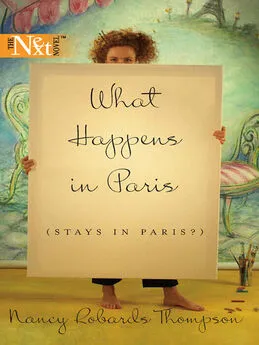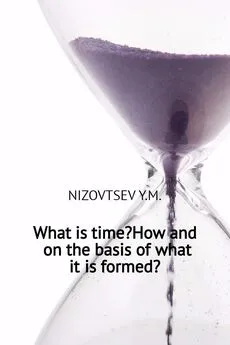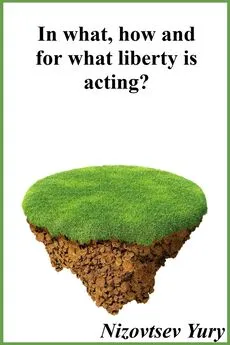Nancy Thompson - What Happens in Paris
- Название:What Happens in Paris
- Автор:
- Жанр:
- Издательство:неизвестно
- Год:неизвестен
- ISBN:нет данных
- Рейтинг:
- Избранное:Добавить в избранное
-
Отзывы:
-
Ваша оценка:
Nancy Thompson - What Happens in Paris краткое содержание
What Happens in Paris - читать онлайн бесплатно ознакомительный отрывок
Интервал:
Закладка:
A wooden easel stood bare in the corner below a cluster of cobwebs; a stack of forgotten blank canvases lined the wall; an empty coffee can for brush cleaner and a paint-splattered palette lay on the table, right where I’d left them the last time I was here—a good three months ago.
The first thing I needed to do was get some natural light into the room. I sidestepped a dead palmetto bug and screamed when I inadvertently dislodged a lizard carcass as I threw open the shutters. I couldn’t even kick it into the corner.
The windows looked out into an adjacent courtyard. A large live oak shaded a blue mosaic fountain surrounded by an overgrowth of purple foxgloves, red, white and pink impatiens, hibiscus and azaleas.
It took me back to the day Blake brought me here the first time, when he leased the studio for me. Art was where we connected. When all else failed in our relationship—when we went months without touching—I’d return to his support of the creative me.
It was hard not to slip into doubt. Since he was not who he pretended to be, did that mean everything else he upheld was a lie, too?
How he said I was talented; that he loved me and wanted a family.
I mean, what was love? It wasn’t quantifiable. You couldn’t measure it by any means other than faith and feeling.
When we met he was a good man with a promising future as an architect. He treated me well, if not passionately.
There’s more to life than passion. Passion was the flame that burned so furiously it burnt out and left you wanting.
I always believed a good marriage was born of the slow, steady rhythm of a man and woman, developed after passion flared and faltered.
Now I don’t know what to believe.
We got married and four months later Ben was born.
I loved Blake. I wouldn’t have married him if I thought he hadn’t loved me.
I stood at my studio window staring at the courtyard, waiting for the pretty view to permeate me and work its magic the way it did that first day, but all I felt was empty. And hot.
Good God, it was sweltering in here.
I reached over and turned on the air-conditioning unit that stuck out of the top of the last set of windows like a boxy appendage. It chugged to life, shaking and rattling as if it would burn itself out before it cooled down the place.
Hmmph. Passion.
It took three trips from my car to the studio to schlepp in all of the supplies I’d picked up at Sam Flax—new paints and brushes, a large bottle of gesso and twenty more stretched canvases of varying sizes—I’d forgotten about the extras in the studio.
Finally, I shut the door on the outside world, determined to rediscover the joy of my studio and the painting process.
I started painting again after our son, Ben, began junior high school. I set up an easel on the screened-in back porch, but I couldn’t leave my paintings out there since it was too damp. I used to talk about how great it would be to have a real space of my own; a spot where I could leave all my supplies and canvases—a real artist’s studio.
The spot at OCA was a reward for sticking it out in a marketing job I detested. Since Blake had broken away from Hartman and Eagle, the architectural firm he’d been with for fifteen years, to start his own business, we relied on my company-funded benefits.
The studio was a compromise. Blake got to be his own boss. I got four walls to call my own. But I didn’t have time for it, really. Working full-time, cooking and cleaning, raising a child and washing Blake’s dirty underwear didn’t leave much time or energy for creativity.
I’d bet over the five years I’d leased the studio, the cumulative amount of time I spent there barely averaged a once-a-month visit; that was more often than we had sex. Every once in a while Blake would get on my case about not using it and threaten to cancel the lease, which would force me to drag myself in there to create. So, coming here today, I decided that until I discovered my own style, I would paint flowers of all shapes and sizes, in the tradition of Georgia O’Keeffe; fragile Lady’s Slipper orchids; big fat roses; vibrant sunflowers.
I set a large canvas on the easel and positioned the maroon orchid on a paper towel.
This would be therapeutic. I could mix the paint to any shade I desired; place it anywhere on the canvas I wanted. I could wash it on in thin, translucent wisps or glob it on in thick, heavy layers.
I set out the new tubes of oil paint I’d purchased, and one by one squeezed a dab of each on my old crusty palette.
If I wanted to paint roses blue, I could. If I wanted to render sunflowers purple—no problem. I might even paint this pretty orchid black to match my mood.
It was my choice.
Paint complied. It would stay true to whatever image I created. It wouldn’t start out as one thing and transform itself into something totally foreign.
Unless I wanted it to.
I picked up the paintbrush, regarded the blank canvas and made a split-second decision not to paint the orchid. Nope. On my canvas, I would honor the traditional. I touched my brush to the glob of alizarin crimson.
Roses are red.
Violets are blue.
My husband is gay.
Shit.
Who knew?
The brush fell from my hand, pinged and clattered on the rough concrete floor. I pressed my shaking fingers to my temples.
Who knew?
Everyone in the world but me?
The small room started spinning, and I edged backward until my butt hit the wall. My knees gave way and I slid down until I half crouched, half sat.
I had no idea what came over me, but suddenly I knew exactly what to do to that canvas.
By the time Rita knocked on my studio door at seven o’clock that evening, I’d painted three canvases. Two florals and what you might call a Picasso-inspired portrait of Blake, though I’ve never been much of a Picasso fan. Rita likes him, but I’ve always thought of him as a creepy misogynist.
Appropriate inspiration for Blake’s portrait.
I painted him with two heads (one male, one female), Medusa-like orchid blooms for hair and a spear driven through his chest. I’d used washes of blues and blacks with a spattering of bloodred applied with a palette knife for emphasis.
“This one’s a little scary.” My sister held up the canvas of Blake. “If he turns up dead, you’d better destroy this or they’ll have all the evidence they need to hang you for the crime.”
I shrugged, not in a jovial mood.
“What’s Fred doing tonight?” I wiped excess paint off my brush with a paper towel, then walked to the sink to wash the residual from the bristles.
Rita and Fred had such a good marriage, after twenty-five years they were even starting to look like each other. Sometimes—especially after the hell I’d just been through—I wondered if my sister hadn’t snagged the last decent man alive.
“He’s at the all-night driving range, getting his golf fix. Where did those come from?” She pointed at the vase of orchid blossoms.
“From Blake’s greenhouse.”
Her blue eyes flew open wide. “Oh. My. God. If you leave right now, you might be able to outrun him. Let me rephrase what I said earlier. He’s going to be the one hung for murder because he’s going to kill you when he sees what you’ve done.”
I smoothed the bristles back into shape and put the brushes in a jar to dry. “I know. I feel kind of bad about it. I didn’t realize how pretty they were. Do you think he’ll notice if I superglue them back on?”
Rita burst out laughing. “He’s going to flip.”
She walked over and picked up a painting of a huge sunflower I’d leaned against the wall. “This is nice. Sort of Van Gogh–esque.” She set it down and stepped back to view it, tilting her head from one side to the other.
“I wasn’t really going for nice when I painted it.”
My sister ignored me. “May I take it with me to show a client who lives in Bay Hill? The colors are perfect for her family room.”
Rita was an interior designer and some of the houses she decorated cost more than I hoped to make in a lifetime.
“You know,” she said, “we really should make some slides of your work. I could probably sell them for you. I don’t know why I didn’t think of this sooner. Are you coming here after work tomorrow?”
“I’m not working tomorrow.” I picked up one of the brushes I’d just cleaned, dipped it in paint and drew a thick sienna line about a third of the way down the canvas.
“You’re not?”
I shook my head. “I’m taking two weeks’ vacation. I called human resources this afternoon and squared away my leave. They didn’t even ask if I’d cleared it with my boss, Jackie.”
I stole a glance at my sister, who’d crossed her thin arms over her tiny middle. She nodded.
“It’s probably a good idea for you to take some time off. If you have the time, you should use it. What are you going to do? Do you want to go away somewhere?”
I shook my head and wiped my hands on a rag. “Nope. I’m going to paint.”
Rita’s eyes widened. “That’s great. That’s exactly what you should do.”
What she didn’t say was, It will be good for you to pour all your anguish into something creative.
“Plus, it will give us plenty of time to photograph your work. So, can I take the sunflower with me, Van Gogh?”
“Sure.”
I watched my sister walk over and carefully pick up the painting and study it again.
Was it this kind of anguish that caused Van Gogh to cut off his ear?
What would Blake do if I sent him my bloodied ear all wrapped up nice and neat in a pretty little package? I could put an orchid on top of the box.
Nah. He wasn’t worth it.
“Is the paint still wet?” Rita asked.
“Nope. That’s the beauty of acrylics.”
I tried not to get my hopes up, but I thought if I sold a few paintings, it would help offset the cost of the studio. I wouldn’t be able to afford it when Blake and I divorced. Because I was sure once he saw how I’d sheared the blooms from his beloved orchids, he’d go for the jugular, saying I had to pay the rent on my studio because he couldn’t afford it, knowing damn good and well I couldn’t, either.
“I’ll tell you what,” Rita said. “Why don’t you spend the rest of the week painting, and I’ll come over Saturday to shoot the fruits of your labor.”
“Saturday? Don’t you have plans with Fred?”
“Fred knows I’m on standby right now.”
I rolled my eyes. Sweet of her, but I didn’t want to become her charity case. “I’m fine, Rita. Really. In fact, I’m sure I can go to Target and purchase a roll of slide film and shoot them myself. Does Target sell slide film?”
“No, Target does not sell slide film. That shows what you know. Fred already has his heart set on golfing this weekend. So you’re stuck with me.”
Tuesday Blake came over for dinner. I hadn’t seen him since we’d called Ben on Sunday, and I was a little nervous about the orchids massacre. But we needed to talk—to discuss money, who’d get what. All the things soon-to-be-divorced people talked about.
Nothing like a divorce to jump start the conversation. In fact, we had so much to talk about, I figured I could tell him I’d watered the plants and then distract him with conversation to keep him out of the greenhouse. It would work for now, and I’d make a point to be out of the house when he came to pick up the plants.
I wanted to meet in a restaurant. A nice, neutral, public place where things wouldn’t get too intense (translate: far away from the orchids).
He insisted we meet at the house. Since he’d moved out, he wanted to look at everything and start making lists.
Читать дальшеИнтервал:
Закладка:



